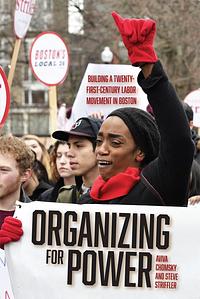Take a photo of a barcode or cover
3 reviews for:
Organizing for Power: Building a 21st Century Labor Movement in Boston
Steve Striffler, Aviva Chomsky
3 reviews for:
Organizing for Power: Building a 21st Century Labor Movement in Boston
Steve Striffler, Aviva Chomsky
challenging
informative
inspiring
reflective
medium-paced
This was an interesting, and often inspiring, collection of labor organizing efforts around greater Boston. The conclusion was thoughtful, although I wasn’t sure there was such a clear thread from the four principles of labor organizing in the conclusion, and the specific stories from earlier in the book. Still, this has given me a long and exciting list of organizations and people to follow-up with
hopeful
informative
medium-paced
i learned more from this book than i have from any class in school, truly comprehensive and applicable to real-life
challenging
hopeful
informative
inspiring
slow-paced
I don't live in Boston, but I plan to move there someday. That's what led me to pick up the book in the first place.
The book goes into the history of Boston labor. It's a really important section and provides a lot of context for the case studies later in the book, but it is pretty dense and dry. I read it because I want to learn about Boston, but I don't think you have to read it if you're not particularly interested in Boston. While it does provide some context for the later chapters about specific sectors of labor or events, the later chapters are completely standalone and don't require the level of detail given in the history section.
The chapters about specific events and areas of union organizing were definitely the strongest part of the book. I found some more interesting than others, but I thought all of them were informative and well-written. Knowing the historical context in depth was nice, but each chapter did a good job of providing the necessary context itself. I particularly liked the chapters about organizing adjunct professors (chapter 6) and decriminalizing sex work (chapter 11).
The book goes into the history of Boston labor. It's a really important section and provides a lot of context for the case studies later in the book, but it is pretty dense and dry. I read it because I want to learn about Boston, but I don't think you have to read it if you're not particularly interested in Boston. While it does provide some context for the later chapters about specific sectors of labor or events, the later chapters are completely standalone and don't require the level of detail given in the history section.
The chapters about specific events and areas of union organizing were definitely the strongest part of the book. I found some more interesting than others, but I thought all of them were informative and well-written. Knowing the historical context in depth was nice, but each chapter did a good job of providing the necessary context itself. I particularly liked the chapters about organizing adjunct professors (chapter 6) and decriminalizing sex work (chapter 11).


